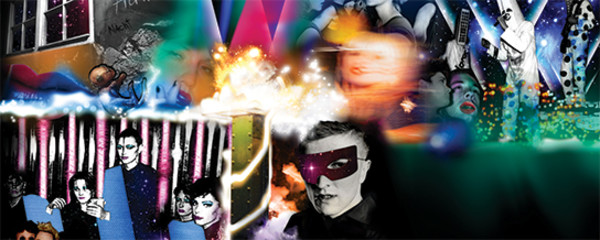What Is It? Neue Deutsche Welle
Larry Tee and DJ Hell may have modernized the combination of irony, nihilism, and asymmetrical […]
What Is It? Neue Deutsche Welle
Larry Tee and DJ Hell may have modernized the combination of irony, nihilism, and asymmetrical […]

Larry Tee and DJ Hell may have modernized the combination of irony, nihilism, and asymmetrical haircuts with synthesizers and drum machines, but they hardly invented it. They–along with artists like T. Raumschmiere, Alec Empire, and White Rose Movement–owe a stylistic debt to the Neue Deutsche Welle (New German Wave) scene of the late ’70s and early ’80s.
Like most post-punk and early New Wave acts, Neue Deutsche Welle bands were more linked by a common aesthetic than a particular sound. NDW borrowed from 1920s–echoing the Dada movement’s pranksterism and anti-establishment sentiments and fetishizing the look of The Cabinet of Dr. Caligari; bands also addressed the Cold War, whose symbols (from military uniforms to Mussolini) were often re-appropriated for kitsch value. Londoners did that too, but NDW’s intentionally simplistic and quirky lyrics (rife with staccato German consonants) and hyper-minimalism, along with the band’s actual proximity to the Berlin Wall, gave the music extra force.
Musically, the early Neue Deutsche Welle underground (from about 1976 to 1981) was art-damaged and proto-electronic, with Abwärts, Malaria!, and Geisterfahrer delivering angular, detuned dance-punk; D.A.F. (Deutsch Amerikanische Freundschaft) and Liasons Dangereuses putting out jerky proto-electro; and Pyrolator playing with tape loops and analog electronics. Industrial noise pioneers Einstürzende Neubauten, who formed in 1980 out of a Berlin Dadaist collective known as Geniale Dillettanten, were also key catalysts.
By 1984, the scene had quickly expanded to include brooding, layered goth sounds from Switzerland’s Grauzone and X-Mal Deutschland and minimal pop from Ideal and Trio. (If you were older than a sperm in the Me Decade, you’ve probably heard Trio’s rudimentary 1982 hit “Da Da Da.”) As with New Wave, larger labels eventually caught on, and by the mid-’80s Neue Deutsche Welle was used to describe Falco and Nena, and many other German pop acts with tenuous connections to the genre’s punk roots.
Today in Berlin, you can go to “oldies” bars that only play pop Neue Deutsche Welle–a bit like going to bad ’80s nights in the U.S. But the legacy of the NDW underground lives in on in other ways. Founding Neubauten and Malaria! member Gudrun Gut is extremely active in electronic music, and runs the Monika Enterprise label. German label Playhouse recently re-released the dark disco-y “Wunderbar” by junkie diva Christiane F. (a.k.a Christiana), and multiple NDW artists (including Nena and Der Plan member Andreas Dorau) have received the remix treatment, courtesy of today’s modern minimal techno stars.

